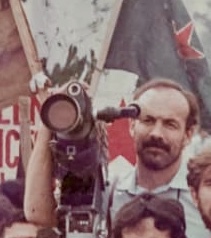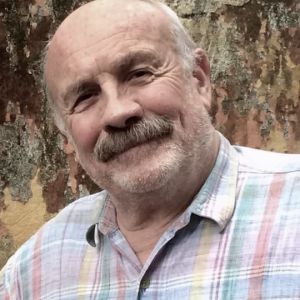I prefer to tell you about the day the first episode of the campaign aired. We had been working for about 15 days at the production company where the equipment, the studio, and the editing room were located. We were working on editing the programs for the “No” campaign. We were working intensely because we were extremely behind schedule in terms of what we wanted to achieve and how to do it, etc. So, we were working 20 hours a day, which was the normal schedule. When you entered the place, you could find people sleeping in the hallways, on a couch, or on a sofa. They would sleep for one, two, or three hours, then wake up and start working again, etc. It was an intense situation. Already a very intense work situation, and if you add the fact that we were living under a highly authoritarian regime and we were opposed to that regime, the tension was very strong.
On the day when our program aired for the first time, we had concerns until the very last moment, and I would say even fears, that the program would be banned at the last minute, that the plebiscite would be suspended, that the program would be suspended, anything could happen. They could even arrest some people. We had a dictatorial government, and like any dictatorial government, it was capricious. It did what it wanted, when it wanted, without any prior planning or notice, of course. So, I would say that the most exciting day was the day we saw the program go on air. This happened in the editing room, which was a large room with a lot of machinery, and we were all crowded there because that’s where the big television monitors were. We were able to see the program appearing, and there was a collective shout as soon as the first image of the program appeared, and we said, “Okay, we’re on the air.” I believe that throughout the plebiscite process, it was probably the most exciting moment I experienced.
Well, I had a very special task within my duties for the campaign. I was in charge of working on Pinochet’s image, and for me, it was a pleasure. It was a challenge and a great pleasure because in the first episode of the campaign, there was a segment where the four members of the junta enter the Ministry of Defense, marching with a very military style. So, I took small pleasures that were subtle, but trying to understand the military language, they were very aggressive. I made the four of them enter with “The Blue Danube,” a waltz, instead of a military march. Those kinds of small joys, which I believe are somewhat petty at the same time, but in the end, they are the small joys one experiences. I indulged in them during several programs.
Well, for example, when I compared Pinochet in civilian clothes to Pinochet in uniform, the possibility of splitting him in half was a way to sever him. Bringing him together was a kind of surgical pleasure, like Frankenstein, assembling a Frankenstein-like figure but with the same person. And since they didn’t want to keep him on screen for too long, whatever was being said would be written over him with thick white and black letters to cover him up. There are several images of him where the word “No” is written with a brush. I made sure that the second vertical line of the “N” fell right in the middle of his face to cover him up. These were small pleasures, yes, nobody would notice, but for me, it was an emotion, a small revenge I had against Pinochet.
In other words, I think one of the great political successes of the campaign was to make power more prosaic, to lower it, to strip it of omnipotence and pomp. It’s like having the “great hero” in quotes right there in front, and his medals falling off. It was a way to diminish him somehow. I asked a producer to go to one of the Yes campaign headquarters to gather material, and obviously, they didn’t want to go because people were working there due to their political convictions as well. So, asking them to go… producers, in general, are very courageous people, they go anywhere. They are bold. If you ask them to ask someone something, they go and ask, if you ask them to find a pink elephant, they find an elephant and paint it pink, it doesn’t matter to them. There are very agile people in that sense, but there was great resistance to going to a Yes campaign headquarters because we are a small country, and for someone to be seen entering the Yes campaign headquarters would produce much more embarrassment than any other assignment they had been given before. So, with a lot of resistance, they went to that place, and the truth is that I wanted badges, rules, music, some posters for the Yes campaign. But what I got was a bunch of photos, official photos of Pinochet, his wife, and all that, which was fantastic. And this photo came out where Pinochet is standing with a camera positioned slightly lower than him to give him more presence, dressed in gala attire, with a ridiculous uniform because it’s like Napoleonic, Prussian, but from the late 17th or early 18th century. With this saber, with both hands on the saber, etc. So, there we started calling him names, and suddenly we decided to look for his true titles, and we found a whole list of titles, that’s like 10% of the titles he had, and we chose some that seemed funnier to us. But he had a bunch of titles because he had been named an illustrious son of many cities and towns, I mean, he had thousands of titles. So, we started from the feet, gradually raising the camera, revealing who it was. By the knees, one could already tell. Until we reached the face and tried to twist the story from real titles to inventing our own titles that were… well, the sole candidate, but then the losing candidate. So, lowering him and moving him down the screen was also a pleasure for me. Bringing him down and giving him a somewhat lilac/purple color was also a pleasure to do.
Well, there are two things. On the one hand, it is said that the campaign and the television spots promised joy. I don’t know if it was a promise. I mean, I don’t think it was strictly a promise, I think it was more of an announcement. If this happens, we will be happier. That will please us, that will make us joyful. But people took it as a promise, and we have to accept that. And I do believe that the end of the dictatorship brought great joy to the country, and people celebrated it a lot. I think the people who voted “No” celebrated it so much that even some people who voted “Yes” started to celebrate because it was a moment of great joy and a sense of closeness among the people. It was a broad concept that brought together people with very different opinions, different political positions, etc. And it even included people who had voted “Yes,” so to speak. But then this “promise” of joy began to be used politically to criticize the new democratic governments. And I do believe that these criticisms are absolutely legitimate, saying that the joy hadn’t arrived, and that “when joy came, it passed me by, I didn’t notice,” etc. And I think they have every right to do so, but I like to make a distinction. We never spoke about happiness coming. And I feel that when they are complaining that joy hasn’t arrived, they are referring more to happiness than to joy. Happiness is something we have been seeking for generations, and for all the generations to come, but we will never find it, but it doesn’t matter. We are moving in that direction. Joy is a much higher concept, so to speak. But yes, I make the distinction between joy and happiness. People also complain a lot because the television spots seem to have a strong presence at the expense of other political actions that existed before or during the campaign. And I think it’s because although the television spots acknowledged all the previous social movements, acknowledged the disappeared, acknowledged the struggles, the gatherings, the protests that took place, etc, in the television spots, what is most remembered is the most beautiful part, the colorful part, and the black and white part is not remembered as much. And that’s why the television spots are surrounded by a veneer of frivolity, and that’s why people criticize the importance given to the television spots in this story.
I believe that everything that was done in Chile was of vital importance in the outcome of the plebiscite. I believe that all the opposition that was directed against the dictatorship led to the plebiscite, and that includes the armed struggle that also took place in the country. In other words, I think it is very pretentious to try to dissect that animal of opposition to the dictatorship, it’s like saying, “Well, we don’t consider this leg.” But how would it have walked without a leg? I think that is important. Now, this was a 15-year marathon, and the last 100 meters were the campaign. And I believe that is where it happened, I mean, the campaign came just before the outcome of the plebiscite, and that’s why it stands out so much. So, the complete marathon started 15 years before, and each of the steps taken by the runners in that marathon was important. One stumble and the runner would have fallen, but the last 100 meters is where everyone pays attention to who will win the race.
Regarding October 5th, it is true that it hasn’t had the celebrations that some might have expected at that time. But in some ways, I agree even if I don’t have them. I believe that winning that plebiscite brought us back to a bit of normality. Therefore, I think it’s fine not to have a permanent celebration. I believe there should be a remembrance or awareness that it should not happen again because it is a huge danger to society, but I don’t think we need to celebrate the plebiscite every year.


